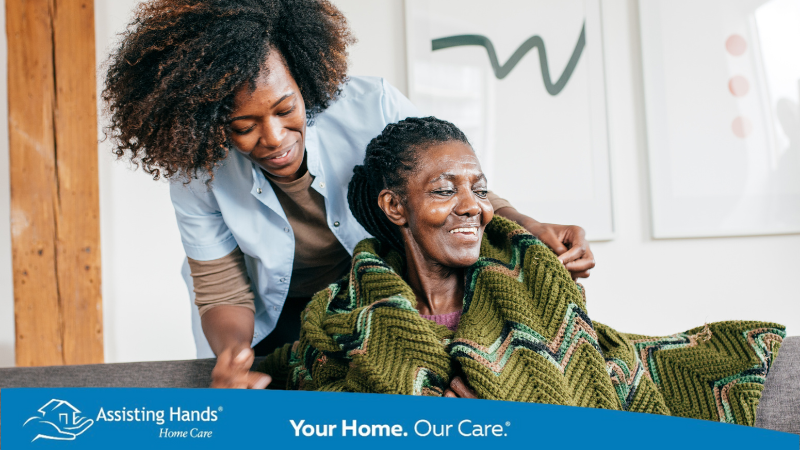
When people reach retirement age, they look forward to having more time to visit with family and pursue their hobbies and interests while continuing to live in the comfortable environment of their home. Many seniors can live at home safely without needing much help, but their need for assistance will likely increase over time as they experience chronic illnesses or decreasing physical and cognitive abilities. Eventually seniors may need help not only with tasks around the home, but also with personal care activities.
If your senior loved ones have decided that they want to age in place but need care and assistance to do so, they could benefit from the help of a home care agency. There are many different types of home care agencies that offer a range of support for seniors with various needs. Home care is also flexible as seniors can get anywhere from a few hours of care per day to 24-hour care, seven days a week depending on their needs.
To determine the best home care option for your senior loved ones, you must first consider their specific needs. You can then look for the type of home care agency that can best accommodate their needs and provide support for your family. In this guide, we explain the different types of home care agencies and what you can expect from each one which will help you decide on the best option for your senior loved ones.
Types of Home Care Agencies
When your senior loved ones reach a point where they need home care, it is important for you and your family to understand the options available when it comes to home care agencies. Some home care agencies provide non-medical personal care and assistance with tasks around the home while others include the help of doctors, nurses, and occupational and physical therapists to provide medical care at home.
The choice of which type of home care agency your family works with should be based on the condition and specific needs of your senior loved ones. The following are the main types of home care agencies to consider.
Home Health Agency
Skilled home care services are delivered by professional home health agencies, staffed with a dedicated team of experts that include medical doctors, registered nurses, and occupational and physical therapists, as well as social workers. Additionally, trained home care assistants and volunteers play a vital role in supporting patients’ needs.
Home health agencies are certified by Medicare, signifying they have passed thorough inspections conducted by federal government agencies. This certification ensures the agency meets the standards required to accept Medicare payments. Medicare-certified home health agencies are recognized for providing high-quality, reliable care to individuals in need.
The goal of home health agencies is to provide seniors with treatment or rehabilitation services in their homes from skilled nurses and therapists. Often, home health agencies specialize in a single service, such as nursing. However, when a care recipient requires multiple specialized services, the agency takes responsibility for organizing and coordinating a supervised caregiving team to deliver comprehensive care. The agency remains fully accountable for all aspects of the care provided.
Hospice
Seniors diagnosed with a terminal illness and a life expectancy of six months or less are eligible for hospice care, a service focused on enhancing quality of life rather than pursuing curative treatments.
Hospice care teams provide compassionate, end-of-life support tailored to the needs of both patients and their families. Skilled professionals deliver medical care and psychological support, while dedicated volunteers may offer spiritual guidance and assistance to grieving loved ones. Available 24/7, hospice teams ensure continuous care and unwavering support throughout this challenging time.
Caregivers manage symptoms and alleviate pain through prescribed medications and therapies, including occupational and physical therapy when needed. Patients also receive Medicare-covered services designed to ease discomfort caused by their illness. Essential medical equipment, such as wheelchairs and walkers, is provided to enhance comfort and mobility.
Hospice care is about dignity, comfort, and support, making the final stages of life as peaceful as possible for seniors and their families.
Home Care Agencies
Many seniors are semi-independent and require only minimal support to live comfortably at home. For those who need limited assistance, home care aides from professional home care agencies offer an excellent solution. These trained professionals provide essential support with activities of daily living (ADLs), such as bathing, dressing, grooming, and toileting.
In addition to personal care, home care aides assist with meal preparation, medication reminders, and light housekeeping, helping seniors maintain a safe and organized environment. Just as importantly, they offer companionship, which plays a vital role in reducing isolation and promoting emotional well-being among older adults.
Home care agencies are paid for privately by the client or through private insurance, including long-term care insurance. Caregivers from home care agencies are employees of the agencies and they are licensed, bonded, and insured.
Registries
Registries act as employment agencies, connecting families with caregivers and nurses to support care recipients. However, caregivers listed in registries are typically not screened, background-checked, or licensed, nor are they required to adhere to government regulations. Families are responsible for hiring, supervising, and paying the caregiver as well as handling state and federal payroll taxes.
Companionship – Non-Medical Home Care Services Agency
Caregivers from companionship/ non-medical home care services agencies visit seniors in their homes to provide them with social companionship and help prevent isolation. They can also provide supervision for those who cannot be left home alone and help with light housekeeping tasks, transportation, and errands. Caregivers from these agencies do not provide assistance with personal care.
Staffing Agencies
Staffing agencies provide a range of services for seniors, including nursing care, companion support, and HCA assistance. In some cases, nurses from these agencies assess a senior’s needs to ensure they receive the appropriate type and level of home care. They also oversee and supervise staff on an ongoing basis to maintain quality care.
However, while nurses may play a supervisory role, most states do not require staffing agencies to hold licenses or meet specific regulatory standards. These agencies are responsible for recruiting their own staff and are ultimately accountable for the quality of care they deliver.
Pharmaceutical Companies
Medications, medical equipment, and professional services are provided to individuals receiving intravenous or nutritional therapies through medical tubes. Pharmaceutical staff from specialized companies or infusion therapy providers handle the preparation and delivery of these medications with precision and care.
Certain Medicare-certified home health agencies are also recognized for offering pharmaceutical and infusion therapy services. Registered nurses may visit seniors at home to guide them in self-administration, ensuring they feel confident and informed. Pharmaceutical companies often require proper licensing and play a crucial role in maintaining the quality of care delivered to patients.
Independent Caregivers
Independent caregivers include a diverse range of caregivers, from registered nurses and therapists to homemakers and senior companions. Care recipients or their families are responsible for independently recruiting, supervising, and compensating these individuals. It is important for clients to adhere to state and federal labor and safety regulations. Notably, these professionals are not required to hold government-issued licenses.
Medical Equipment and Supply Dealers
Some seniors may rely on wheelchairs, walkers, catheters, or wound care supplies to maintain their independence at home. Medical equipment and supply providers not only deliver and install these essential items but also ensure seniors are properly trained on how to use them.
Some providers offer respiratory therapy services, helping seniors become familiar with their breathing equipment. Additionally, nurses are sometimes employed to teach recipients how to self-administer medications and nutritional formulas, empowering them to manage their care independently.
In certain states, these organizations may be required to obtain specific licenses, ensuring quality and compliance with regulations.
Physical, Occupational, or Speech Therapy
Seniors who need help relearning how to manage personal care tasks, regaining their strength, or improving their speech after an illness or injury can benefit from occupational, physical, or speech therapy at home. Care from one of these professional therapists is prescribed by a doctor and the therapist will visit your loved ones in their home to provide treatment.
The treatment is temporary with the goal of helping them regain as much of their abilities as possible.
Medical Social Services
Medical social workers help those who receive medical care due to chronic conditions by providing counseling and referring them to helpful community resources. They may also act as a case manager for your loved one and help coordinate care.
In-Home Care from Assisting Hands

Choosing the right home care agency for your senior loved ones is an important decision that ensures they receive the necessary support while maintaining their independence and quality of life. With various types of home care agencies available, from skilled medical care to non-medical companionship services, families can find an option that best suits their loved one’s needs. By understanding the different levels of care and exploring available resources, you can make an informed choice that provides comfort, safety, and peace of mind for your loved ones as they age in place.
Finding the right home care agency for an aging loved one can feel overwhelming with so many options to consider. Instead of navigating countless choices, choose Assisting Hands Home Care—a trusted provider of comprehensive non-medical senior home care.
Assisting Hands Home Care is a reputable home care agency with trained and licensed caregivers that have each passed a background check. We offer a wide range of flexible home care services, from respite care, 24-hour home care, and live-in care to memory care, companion care, and post-hospitalization support. No matter the type of care your loved ones need, we create tailored care plans to accommodate their unique needs.
Our compassionate caregivers assist seniors with activities of daily living, including bathing, dressing, toileting, meal preparation, and light housekeeping. We also provide transportation to medical appointments and handle grocery shopping, ensuring your loved one receives the care and support they need to thrive at home.
Turn to a home care agency with a reputation for excellence. Assisting Hands Home Care focuses on returning dignity and as much independence as possible to the lives of seniors in our care. Contact us at (630) 526-6522 to start on the path toward a better quality of life for your loved one.















